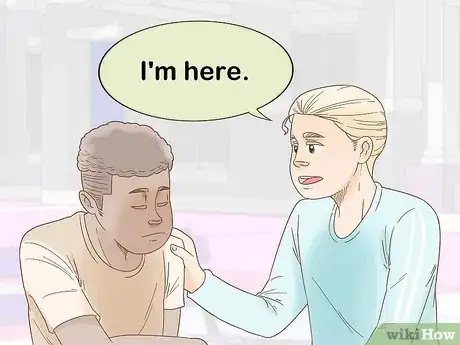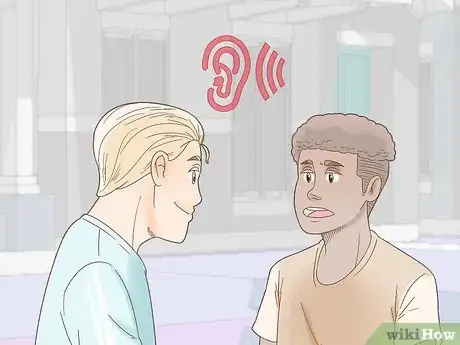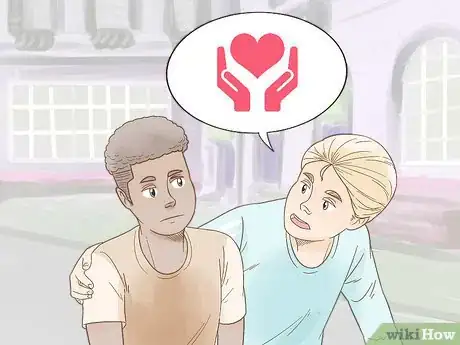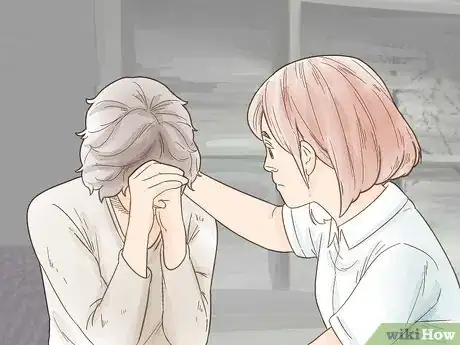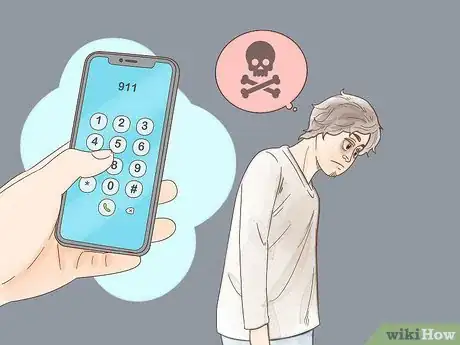This article was co-authored by Leslie Bosch, PhD. Dr. Leslie Bosch is a Developmental Psychologist, National Board Certified Health and Wellness Coach, and Owner of Bosch Integrative Wellness. With over 15 years of experience, she specializes in providing stress relief coaching services to individuals and groups using a variety of scientifically proven methods for change including motivational interviewing, positive psychology, self-compassion, non-violent communication, social learning theory, and self-determination theory. Dr. Bosch received training from the Andrew Weil Center for Integrative Medicine at the University of Arizona and earned a PhD in Human Development and Family Studies from The University of Arizona. She is also a member of the National Board of Health and Wellness Coaching Association. Dr. Bosch has published many papers and been featured in the media numerous times.
This article has been viewed 23,239 times.
It’s hard to watch your friend suffer through a difficult time. You care deeply about them and you want to do everything you can to make them feel better. Unfortunately you don’t know the right thing to say or do. You don’t want to offend or further hurt them but you desperately want to help. People’s feelings can be delicate and you need a strategy to deal with them effectively.
Steps
Talking to your Friend
-
1Take the initiative. Your friend may be too proud to let you know that they’re feeling upset, or they may not be the type to show their emotions. Don’t wait for them to tell you something's wrong. If you know your friend is having a rough time, make sure they know you care and that you’re there to talk to them about it. Don’t force the conversation to happen. Simply let them know that you realize they’re going through a tough situation and that they can come to you if they need to discuss it. Say something like:
- “I’m very sorry to hear about the passing of your grandfather. I want you to know that you’re very important to me and if you ever need someone to talk to, I’m here.”
- “I know you didn’t get into the college you were hoping you would. I’m always around if you ever want to talk about it.”
- “I heard you didn’t make the basketball team. I know you trained you really hard for it. If you ever want to let off any steam, I’ll be there.”
- “I’m sure the divorce has been really difficult to cope with. Let me know if you want to discuss it.”
-
2Listen to your friend. Make the conversation about them. Show an interest in everything your friend has to say. Make eye contact, keep a concerned expression on your face and point your chest toward them while they’re talking. Don’t take the time to talk about yourself and don’t try to “fix” your friend's problems. Most of the time people only need to be heard and they don’t want to hear answers. Make sure your friend knows that they have your full attention.
- Listening to your friend when they're feeling down can help comfort them and allow them to destress.
- You may want to tell stories from your own life to relate to your friend, but you’ll better serve them by being quiet and letting them talk.
- Keep your opinions to yourself. Your friend will feel worse if they feel like you’re judging them.
- Never say “I told you so.” Even if you warned your friend about a situation in the past, what’s done is done. Being right isn’t as important as being there for your friend.
Advertisement -
3Encourage them to remember the good times. Try to get your friend to reminisce about experiences that they enjoyed. You can bring up times when the two of you had fun together or ask them to tell you about memories that make them happy.[1] Make sure to let them tell the story. Reliving happy moments from their past will help put them back in the state they were in when the events took place. Say things like:
- “Do you remember that time we went to the beach for spring break? What was your favorite part of that trip?”
- “I know you really miss your uncle. What’s the funniest thing he would do at your family reunions?”
- “Lucy was such a good dog. What was she like as a puppy?”
-
4Offer compassion without being presumptuous. Everyone feels emotions in their own way. You may have had a similar experience to your friend's, but that doesn’t mean you know exactly how they feel about it. If you act like you know exactly what your friend is feeling, they may think you’re disqualifying their emotions. Try to show your friend you care and that you realize their feelings are unique. Say something like:[2]
- “I can’t fully understand your dilemma, but I really want to help you get through it.”
- “There’s no way for me to know exactly how this is affecting you, but I’ll try my best to help you cope with it.”
- “I realize what you’re going through is deeply personal and I appreciate you sharing your feelings with me.”
-
5Let your friend know you’re proud of them. Negative emotions can eat away at a person’s self esteem. Your friend may need help rebuilding confidence. Tell them why you think they’re great. Bring up their past successes. Remind them of situations where you were impressed with the way they handled things. Let them know that you’re glad to have a close friend with all their great qualities. Say things like:
- “You’re an amazing parent. You’ve raised such wonderful, talented children.”
- “Remember that time we got lost on that hiking trip? I’m really glad you had the skills to guide us home.”
- “I’m really grateful to have a friend like you who’s smart, caring and fun to be around.”
Taking Action to Help your Friend
-
1Help them with their day to day responsibilities. Bad feelings may drain your friend’s energy. Your friend may find it hard to get up and take care of obligations which could lead to even more stress. See if you can take some of the pressure off of your friend. Ask what you can do lighten their load.
- Go to the market to pick up groceries for your friend.
- Pick up your friend’s kids from school.
- See if there’s any yard-work you can do around your friend’s house.
-
2Offer your friend something to eat or drink. Certain foods have been shown to help people feel better. Hot drinks, like tea or coffee, can have a calming effect on a person’s emotions while spicy foods and chocolate can cause the brain to release endorphins (a hormone that makes you feel happy and content).[3]
- Be careful that you don’t encourage your friend to use food to deal with all their problems. Constant comfort eating can lead to binging which can cause a variety of health problems.
- A little alcohol can help boost your friend’s mood, but too much could have the opposite effect.
-
3Give your friend a hug. Show your friend you care by wrapping your arms around them in a warm, genuine hug. A hug has incredible healing power to make a person feel better. Psychologists theorize that hugs make us feel calm and protected by reminding us of what it’s like to be a baby in the womb.
- Give your friend the right type of physical attention for them. Your friend may not need a hug but may simply want you to hold their hand for a while or give them a shoulder rub to help them release stress. You can even do something nice for them like paint their nails or do their hair.
- Use your better judgement. Always ask before hugging or initiating any sort of physical contact with your friend. Some people don't like to be touched when they feel vulnerable. They may prefer to have their own personal space to deal with their issues.
-
4Invite your friend to do something fun. If your friend has been stuck inside all day feeling bad, they could benefit from a change of scenery. Try to get them out of the house. Make plans to do something both of you enjoy. Doing something social might help get their mind of their issues. If your friend doesn’t feel ready to be around large groups of people you can invite them to do something with just you. Some ideas for fun outings include:
- hiking
- exercising together
- riding go carts
- going out to eat
- attending a party
- seeing a movie
Getting your Friend Professional Help
-
1Look for warning signs. If your friend is unable to shake their depression, they may at some point contemplate suicide. If you fear for your friends safety, watch out of for warning signs that they could be planning something dangerous. Some common behaviors of suicidal people include:
- expressing extreme anger or guilt
- neglecting personal hygiene
- obsessing about death
- becoming dependent on alcohol
- giving away their favorite possessions for no reason
- getting their affairs in order
- seeking to obtain guns, pills or other tools to die by suicide
-
2Talk with your friend about suicide. If after watching your friend’s behavior you still fear that they may die by suicide, have a conversation with them about the topic. Don’t act shocked if they admit that they’re thinking about it. If you act surprised or judgmental, they may shut you out and you won’t be able to help them. Try to make them comfortable enough to be honest with you. The questions you should ask if you suspect someone of being suicidal are:[4]
- “Are you feeling so bad that you are thinking about suicide?”
- “Have you thought about how you would do it?”
- “Do you have what you need to do it?”
- “Have you thought about when you would do it?”
-
3Be understanding. Show empathy, and try to understand where they coming from, how they feeling, and what they're thinking. Talking about suicide can be an intense experience. Prepare yourself to deal with your friends emotions. You don’t know how they might react.[5] They might yell, cry or hit things. Do your best to stay calm so you don’t escalate the situation. Remember that they’re only acting out because they are in extreme emotional anguish.
- If you feel that your friend poses a threat to your personal safety, get out immediately.
-
4Make sure your friend gets the help they need. If you think your friend has a moderate to severe risk of dying by suicide call 911, or emergency services in your country if you're outside of the United States. If your friend has a low risk of dying by suicide but still needs to talk to someone, have them contact a suicide prevention line, such as the 988 Suicide and Crisis Lifeline if they're in the United States, which can be reached by calling or texting 988. If you're outside of the United States, have them contact the suicide prevention hotline for their country. Encourage your friend to visit a mental health facility and to enroll in therapy sessions. A person who is in distress or has any risk of dying by suicide should never be left alone. Stay with your friend until they are in the care of a professional or with a trusted family member or friend. The risk levels associated with a suicidal person are:
- Low risk: Your friend has some suicidal thoughts but no plan to do it and says they will not attempt suicide.
- Moderate risk: Your friend has suicidal thoughts and a vague idea about how they might do it. Their plan isn't very lethal and they say they will not attempt suicide.
- High risk: Your friend has suicidal thoughts and a specific plan about how they would do it. Their plan is very lethal but they say they will not attempt suicide.
- Severe risk: Your friend has suicidal thoughts and a plan to attempt suicide that is highly lethal. They say that they will attempt suicide.
Expert Q&A
-
QuestionHow do you cheer up a sad friend?
 Leslie Bosch, PhDDr. Leslie Bosch is a Developmental Psychologist, National Board Certified Health and Wellness Coach, and Owner of Bosch Integrative Wellness. With over 15 years of experience, she specializes in providing stress relief coaching services to individuals and groups using a variety of scientifically proven methods for change including motivational interviewing, positive psychology, self-compassion, non-violent communication, social learning theory, and self-determination theory. Dr. Bosch received training from the Andrew Weil Center for Integrative Medicine at the University of Arizona and earned a PhD in Human Development and Family Studies from The University of Arizona. She is also a member of the National Board of Health and Wellness Coaching Association. Dr. Bosch has published many papers and been featured in the media numerous times.
Leslie Bosch, PhDDr. Leslie Bosch is a Developmental Psychologist, National Board Certified Health and Wellness Coach, and Owner of Bosch Integrative Wellness. With over 15 years of experience, she specializes in providing stress relief coaching services to individuals and groups using a variety of scientifically proven methods for change including motivational interviewing, positive psychology, self-compassion, non-violent communication, social learning theory, and self-determination theory. Dr. Bosch received training from the Andrew Weil Center for Integrative Medicine at the University of Arizona and earned a PhD in Human Development and Family Studies from The University of Arizona. She is also a member of the National Board of Health and Wellness Coaching Association. Dr. Bosch has published many papers and been featured in the media numerous times.
Developmental Psychologist I believe the best option is usually some acts of kindness and expressions of empathy. Try to demonstrate that you understand where they're coming from and validate their experience, whatever it is. If they're having a hard time, try to see how you can help and offer this help.
I believe the best option is usually some acts of kindness and expressions of empathy. Try to demonstrate that you understand where they're coming from and validate their experience, whatever it is. If they're having a hard time, try to see how you can help and offer this help. -
QuestionWhat can you say to make someone feel better?
 Leslie Bosch, PhDDr. Leslie Bosch is a Developmental Psychologist, National Board Certified Health and Wellness Coach, and Owner of Bosch Integrative Wellness. With over 15 years of experience, she specializes in providing stress relief coaching services to individuals and groups using a variety of scientifically proven methods for change including motivational interviewing, positive psychology, self-compassion, non-violent communication, social learning theory, and self-determination theory. Dr. Bosch received training from the Andrew Weil Center for Integrative Medicine at the University of Arizona and earned a PhD in Human Development and Family Studies from The University of Arizona. She is also a member of the National Board of Health and Wellness Coaching Association. Dr. Bosch has published many papers and been featured in the media numerous times.
Leslie Bosch, PhDDr. Leslie Bosch is a Developmental Psychologist, National Board Certified Health and Wellness Coach, and Owner of Bosch Integrative Wellness. With over 15 years of experience, she specializes in providing stress relief coaching services to individuals and groups using a variety of scientifically proven methods for change including motivational interviewing, positive psychology, self-compassion, non-violent communication, social learning theory, and self-determination theory. Dr. Bosch received training from the Andrew Weil Center for Integrative Medicine at the University of Arizona and earned a PhD in Human Development and Family Studies from The University of Arizona. She is also a member of the National Board of Health and Wellness Coaching Association. Dr. Bosch has published many papers and been featured in the media numerous times.
Developmental Psychologist In most situations, listening is better than trying to say anything. Listening helps the person to calm down, and to feel that they are more connected to. Knowing that others care about them might help them more than you imagine.
In most situations, listening is better than trying to say anything. Listening helps the person to calm down, and to feel that they are more connected to. Knowing that others care about them might help them more than you imagine.
Warnings
- Don’t leave your friend’s side until they’ve attained professional help if you’re worried they may die by suicide.⧼thumbs_response⧽
- Never judge your friend’s emotions. Just be there for them.⧼thumbs_response⧽
- Don’t wait for your friend to come to you. If you think there’s something wrong with them, ask if you can help.⧼thumbs_response⧽
References
- ↑ http://thinksimplenow.com/happiness/make-others-feel-special/
- ↑ http://psychcentral.com/lib/best-things-to-say-to-someone-whos-depressed/
- ↑ http://youqueen.com/life/personal-development/5-great-things-to-do-to-make-someone-feel-better
- ↑ http://www.suicide.org/how-to-help-a-suicidal-person.html
- ↑ http://www.helpguide.org/articles/grief-loss/supporting-a-grieving-person.htm
